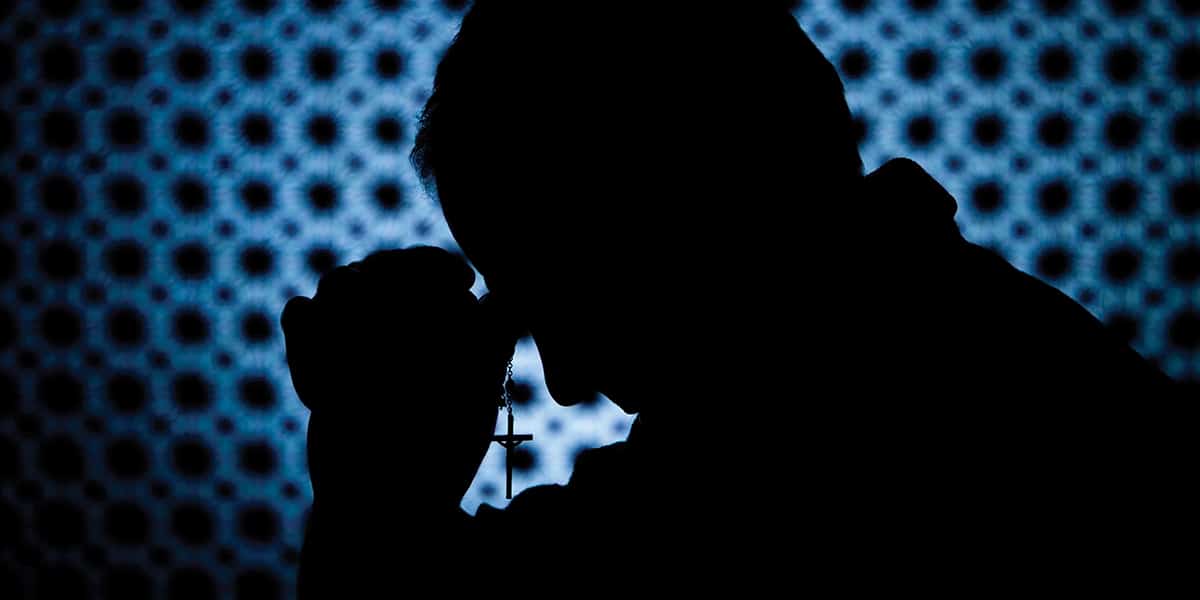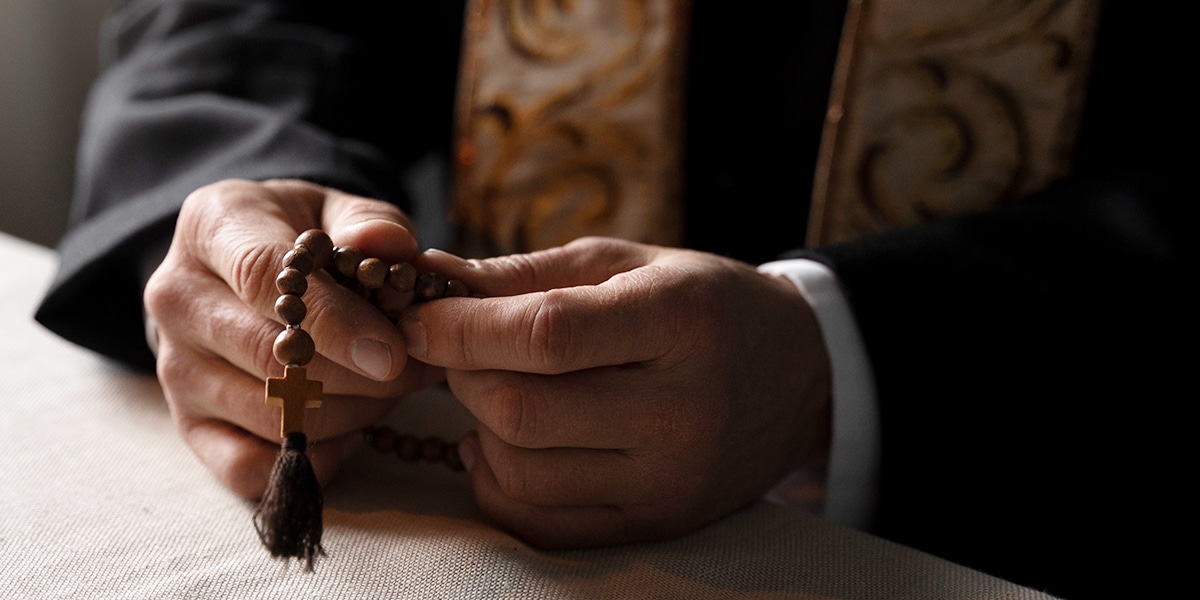In the aftermath of the Pennsylvania grand jury report on clergy sex abuse, this priest calls for personal holiness, repentance, and a solid foundation in Jesus Christ.
In August 2018, a Pennsylvania grand jury released a report on clerical sexual abuse in six Catholic dioceses in the state. The report identified more than 1,000 victims of 300 accused priests and the effort by Church authorities to ignore or conceal those allegations. The dioceses investigated were Allentown, Erie, Greensburg, Harrisburg, Pittsburgh, and Scranton. (The dioceses of Altoona-Johnstown and Philadelphia had previously posted on the Internet the names of priests who had been credibly accused.)
Father Stephan A. Isaac, 31, a priest in the Allentown Diocese, was horrified when he read the report. “My initial reaction to the findings was sheer outrage at the heinous evils and crimes that were committed against innocent, vulnerable children and teenagers—outrage at the fact that the priesthood of Jesus Christ was abused so satanically in order to manipulate children and viciously violate their intrinsic dignity,” he says. “I remember literally getting physically sick reading the details of the sexual abuse and the subsequent cover-ups. I couldn’t stop thinking about the victims/survivors and their families and all of the pain and suffering they’ve had to endure over the years because of these horrific crimes.”
A Vocation Spanning East to West
Ordained in 2016, Father Isaac is assistant pastor of St. Ignatius Loyola Parish and chaplain of Berks Catholic High School, both in Reading, Pennsylvania. Of Lebanese descent, he was baptized and confirmed in the Maronite Catholic Church but received the sacraments of Reconciliation and Eucharist in the Roman Catholic Church. “I was blessed to be born and raised a Catholic in a devout Catholic family where the faith was extremely important to my parents. I honestly don’t know where I’d be right now in my life without my Catholic faith.”
Though he thought about the priesthood as early as seventh grade, he says: “It wasn’t until about my sophomore year in college at American University that I started to think about and discern the priesthood again. . . . The deeper I delved into the Catholic faith, the more I loved it.” By the time he graduated from college in 2010, he knew he wanted to enter the seminary.
He credits his Lebanese heritage for his inherent zest for life. “I love being Lebanese, and I take great pride in my ethnic heritage. Our Lebanese culture is centered on God and family. And the Lebanese love the gift of life. I definitely think being Lebanese has shaped my personality and my love for life and all the adventures that life brings,” says Father Isaac.
He says he feels blessed to be a Maronite Catholic who is ordained in the Roman Catholic Church. “My vocation encompasses both East and West, and so, as a priest, I feel that my priesthood is enriched by both the Eastern and Western traditions of the Church. In his papal encyclical ‘Ut Unum Sint,’ Pope John Paul II famously remarked that ‘the Church must breathe with her two lungs!’ And so, in my priesthood, you could say that I literally breathe with both lungs of the Church, and I think that only enriches my priestly service to the people of God.”
A Continuing Crisis in the Church
At this difficult time in Church history, Father Isaac seems to have taken a deep breath with both of those lungs and called on his faith and Lebanese love for life to rise to the challenges the Church is facing today.
“The sexual abuse of children by clergy and their subsequent cover-ups are disgusting and repulsive evils that have absolutely no place in Christ’s Church, and we cannot condemn these evils enough. I can’t see how any human being with a functioning moral conscience could read the Pennsylvania grand jury report and not react with sheer outrage and horror in the face of such evil and barbaric crimes committed by men who were supposed to embody Christ himself,” says Father Isaac, who knew two priests from his childhood listed in the report for the Allentown Diocese. “I felt so hurt and betrayed by those who committed such horrific crimes and those who actively covered them up.”
Unfortunately, while predator priests have victimized thousands, their deeds have also tarnished good priests. “I would say that the grand jury report has made being a priest more difficult for all priests,” he says, but observes that “Jesus was punished and vilified for the sins and crimes of others—sins and crimes that he never committed. Therefore, why should his priests not also share in his suffering in this regard? I couldn’t care less if people look at me with a judgmental hatred or condemnation. I’m more concerned about the victims/survivors and their families and the justice and healing that they deserve.”
Most of the Catholics he has interacted with since the release of the grand jury report have had a similar reaction. Some have suggested that the Church should abolish priestly celibacy. Father Isaac feels that blaming celibacy is “falsely attributing the evil of child sexual abuse to the beautiful discipline that is nothing but an expression of love for Christ and his Church.” He and his brother priests at St. Ignatius have received an outpouring of love and support from parishioners: “They know us, and they know that we strive to love and serve them with every fiber of our being. They also know . . . that the overwhelming majority of priests are good and holy men who honestly and sincerely do their best to love and serve the people of God.
“I’ve always believed in a very fundamental principle: Contrast provides clarity. And the contrast between a good, holy priest and the evil criminals listed in the Pennsylvania grand jury report is stark. And when people see that contrast and encounter a good, holy priest, they will hopefully know that such evil criminals who’ve abused children are an extreme minority who in no way represent the priesthood of our Lord Jesus Christ,” he says.
The scandal has not changed how Father Isaac carries out his ministry, but it has deepened his desire for holiness. “I’ve always strived to carry out my priestly ministry with great prudence. If I have to meet alone with someone for the sake of privacy and confidentiality, I try to make sure that one of us is plainly visible to any onlookers and bystanders,” he says. “If anything, the entire scandal has motivated me to be the best priest I can be with the help of God’s grace. The scandal has deepened and intensified my hatred for sin and evil, which we all need if we’re truly going to allow Christ to transform our lives and sanctify us.”
Keeping the Faith
In addition to the many practical measures to prevent sexual abuse and ensure transparency and accountability within the Church, Father Isaac believes there are two indispensable remedies for combating this evil: “Personal holiness and repentance are and always have been the two antidotes to all of the sin, evil, scandal, and corruption in the Church’s history. All practical reforms and renewal within the Church must begin with personal holiness and repentance.”
He also believes that Catholics must build their faith on the solid foundation of Jesus Christ: “We must root our entire Catholic faith in our Lord Jesus Christ and in the mission and identity of his Catholic Church, not in any one pope, bishop, priest, deacon, or layperson. Christ is our eternal hope and salvation, and so he will carry us through this dark period of the Church’s history, and by his grace the Church will be purified of this disgusting filth and renewed in his love and mercy.” In addition, he says there is no sin, scandal, or crime that could destroy “the eternal, unchanging, and saving truths of our Catholic faith. . . . I absolutely refuse to let a bunch of criminals, child molesters, rapists, and their enablers destroy my Catholic faith and rip me away from Christ and his Church.”

“The Clergy must listen to the people in the pews. The bishops should step up and lead in this regard. Hiding in chanceries and rectories behind lawyers and carefully crafted press releases and talking points is not going to help the Church to heal and move forward effectively.”
Last August, in response to the grand jury’s report, Allentown Bishop Alfred Schlert suggested that all priests observe Thursdays as a day of penance and fasting in reparation for the evils committed against the body of Christ in the form of clergy sexual abuse. Father Isaac explains that the bishop chose Thursdays “because it is on Holy Thursday that we celebrate the institution of the priesthood by Christ himself. Prayer, fasting, and penance are also a most appropriate response to this entire scandal, and that is something all Catholics can do to not only grow in faith, hope, and love, but to also make reparation for the barbaric crimes of clergy sexual abuse. Such spiritual practices can and should be offered up for the Christ-centered healing of the victims/survivors and their families.”
A Need for Renewal and Transformation
Father Isaac believes that the Church needs an authentic renewal in Christ. “First and foremost, every single one of us as Catholics needs to allow the Lord Jesus to transform our lives and make us saints. Throughout her nearly 2,000-year history, whenever the Church was in great need of reform and renewal, God raised up saints—holy men and women—to help purify and strengthen his Church.”
Second, Father Isaac says, “We need to take prudent, practical measures to strengthen transparency and accountability within the Church so that there can be no abuses of power and cover-ups of sexual abuse and misconduct. Catholics in the pews need to hold us clergy accountable, and that most especially includes bishops. Nobody is above the law, especially God’s divine law.” He hopes the Church will “adopt practical, effective measures to hold bishops and other high-ranking prelates accountable to make sure that sexual abuse and misconduct are prevented and dealt with decisively.
“Thankfully, since 2002, the Church has taken strong measures of reform to ensure that our children are safe and that any sexual abuse of minors is reported immediately to law enforcement. At least in the Diocese of Allentown, Pennsylvania, the Church is going above and beyond the requirements of state law—as we should—to ensure the safety and protection of all of our children. All clergy, staff, and volunteers in the Diocese of Allentown undergo serious training to be able to identify and report suspected child abuse. The Church must continue down the path of practical reform that began in 2002 to make sure these evils never happen again.”
Finally, he says, “Clergy, especially bishops and priests, must listen to the people in the pews, accompany them on the path to holiness and healing, and empower them to be an integral part of the solution and the ongoing reform and renewal within the Church. The bishops should step up and lead in this regard. Hiding in chanceries and rectories behind lawyers and carefully crafted press releases and talking points is not going to help the Church to heal and move forward effectively.
“We must regain credibility and lost trust among our own people and those outside the Church,” he continues. “We must discuss the scandal openly and honestly with our people; listen to their concerns, ideas, feedback, and morally justified anger; and empower them to be a part of the solution. Open and honest dialogue and collaboration with our people must be at the core of the Church’s healing and ongoing renewal.”
Time for Bold Action
Father Isaac insists that the clerical sexual abuse scandal is a call to action for all Catholics. “Now is not the time to cower in fear and be ashamed to be Catholic. Now is precisely the time to boldly live our Catholic faith in all of its truth, goodness, and beauty, in all of its splendor, so that the world may know what it truly means to be a Catholic,” he says.
“Let’s show people by our own holiness and love what it means to be Catholic and what the Catholic Church really is.”








